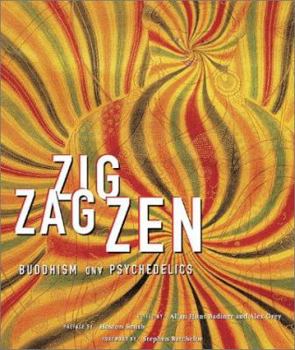Zig Zag Zen: Buddhism and Psychedelics
Select Format
Select Condition 
Book Overview
Buddhism and psychedelic experimentation share a common concern: the liberation of the mind. Zig Zag Zen launches the first serious inquiry into the moral, ethical, doctrinal, and transcendental considerations created by the intersection of Buddhism and psychedelics. With a foreword by renowned Buddhist scholar Stephen Batchelor and a preface by historian of religion Huston Smith, along with numerous essays and interviews, Zig Zag Zen is a provocative and thoughtful exploration of altered states of consciousness and the potential for transformation. Accompanying each essay is a work of visionary art selected by artist Alex Grey, such as a vividly graphic work by Robert Venosa, a contemporary thangka painting by Robert Beer, and an exercise in emptiness in the form of an enso by a 17th-century Zen abbot. Packed with enlightening entries and art that lie outside the scope of mainstream anthologies, Zig Zag Zen offers eye-opening insights into alternate methods of inner exploration.
Format:Hardcover
Language:English
ISBN:0811832864
ISBN13:9780811832861
Release Date:April 2002
Publisher:Chronicle Books
Length:240 Pages
Weight:2.44 lbs.
Dimensions:1.1" x 7.9" x 9.2"
Customer Reviews
2 ratings
The Elephant in the Room
Published by Thriftbooks.com User , 15 years ago
It's the elephant in the room. Everyone knows it's there, but few feel comfortable talking about it. It's the relationship between Buddhism and Psychedelic drugs in the West. Zen centers, sanghas, and meditation retreats are littered with former (and current) psychonauts and trippers. You can take one of three tenable stances on the issue: 1.) Psychedelics are intoxicants and are, therefore, antithetical to true Buddhist practice OR; 2.) Psychedelics are not intoxicants at all, but are powerful sacraments that have had an undeniable historical influence on Tantra, Vedanta Hinduism, and Vajrayana Buddhism OR; 3.) you can take the middle path, acknowledging that psychedelics are powerful, but also admitting that they can be dangerous, for they are full of "raja", full of fire that can transform but that can also consume. One of these three views holds the truth. Psychedelics are tools that help Buddhist practice, they are hindrances that obstruct Buddhist practice, OR psychedelics are value-neutral, possessing the power to help or harm depending on context. But anyway you cut it, psychedelics are hardly IRRELEVANT to Buddhist practice. The position that they are is untenable and, frankly, provincial. Why are there so many psychedelic Buddhists and so many Buddhist psychonauts? What do psychedelics and Buddhism have to do with one another? Both psychedelic exploration and Buddhism center around the quest for non-ordinary states of consciousness--states of profound unity, where the subject-object dichotomy--the boundary demarcating self and cosmos dissolves. That's not to say that Buddhism and psychedelics are the same. As Terrence McKenna says in his part of the book, "Buddhism is a theory out of which a practice can be teased; Psychedelics are a practice out of which a theory can be teased. There are those who believe that psychedelics can never produce the same experiences as Buddhist practice. There are those who think that psychedelics provide a much richer and more immediate experience than sitting on a mat and counting the breath could ever hope to. And there are, again, those who think that the advantages and disadvantages of mixing psychedelics and Buddhism need to be weighed on a case by case basis. You'll find all the arguments here in "Zig Zag Zen." Alex Grey is careful to provide as many perspectives as possible. You'll hear from Robert Thurman, the chair of Buddhist Studies at Columbia. You'll hear from Rick Strassman M.D. and from the mystical shaman McKenna, of course. Don't make up your mind until you've carefully considered them all. An open mind is an essential tool on the path to enlightenment. In this particular work, Grey doesn't take a stance on whether drugs can or cannot help you achieve liberation (although if you've ever seen his paintings, it's pretty clear that he has a penchant for tryptamines). Grey's position is that you ought to figure out such matters for yourself. Those who say this book has nothing to do
web of mind
Published by Thriftbooks.com User , 21 years ago
a beautifully designed and arranged collection of articles that expose the intelligent and creative uses of psychoactive chemicals.While the "spiritual purists" may balk at the contention that chemicals seriously open up levels of consciousness and awareness, one comes away with deeper appreciation of various traditional methods of enlightenment (with and without chemicals).This work effectively counteracts the anti-drug propaganda that has shamefully denigrated certainly respectable uses of treasured substances.Zig Zag Zen does the universe proud.





